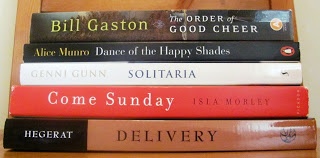Towards the end of last semester, I was talking to a fellow writing student about what classes she was planning to take. I mentioned I was hoping to get into the fiction workshop and asked if she was also taking fiction. “Oh, no,” she said, “I can’t write the kind of fiction they want here.”
That seems to be a common conception about literary fiction—it’s hard to read and hard to write. I’m not going to say it isn’t, because writing is hard work and some types of fiction do require more of the reader than others. I think the key difference between literary fiction and non-literary fiction (or genre fiction) is that literary fiction is about character and genre fiction is about plot. There are, of course, exceptions to the rule, but the literary fiction I’ve read explores human nature—why someone would do something, rather than how he or should would do it.
Author and former literary agent Nathan Bransford says it slightly differently:
“In commercial fiction the plot tends to happen above the surface and in literary fiction the plot tends to happen beneath the surface.
“Most genre fiction involves a character propelling themselves through a world. The character is an active protagonist who goes out into a world, experiences the challenges of that world, and emerges either triumphant or defeated. … Sure, the character might have an inner struggle and be a richly rendered character, but for the most part genre novels are about the exterior—they are about how a character navigates a unique world.
“Now consider literary fiction. In literary fiction the plot usually happens beneath the surface, in the minds and hearts of the characters. Things may happen on the surface, but what is really important are the thoughts, desires, and motivations of the characters as well as the underlying social and cultural threads that act upon them.”
It is this close look at “the thoughts, desires, and motivations of the characters” that makes literary fiction “hard” to read and write. I would much rather be doing something—even if it’s dishes or laundry—than reflecting upon my mistakes. So a story—even a short story—that devotes a lot of words to reflecting upon what is a small but significant event in a character’s life can be tough to read. And tough to write.

I just handed in my second story for my fiction class (that’s it for this semester, thankfully). Both times I’ve handed in material for this class, I’ve written two stories before finding the one I wanted to workshop. The first stories didn’t feel “literary” enough. And that is a nebulous definition, one I’ve reached by reading a lot of fiction—both genre and literary. It’s easier to recognize what I like about the literary fiction I’ve read than it is to actually write stories which explore character in the same way.
While I often despair of writing like the authors I admire, I’ve come to this conclusion: whatever I write, I will try to be the best writer that I can be. Whether I’m working on my YA fantasy novels (genre fiction for sure!) or short stories for my university fiction classes (and trying to be more literary), I’ll grapple with the words and the plot and the characters and all the elements that must come together to make a good story—literary or not.

3 Comments
Tracy – I also had a nebulous idea about what literary fiction is, until I actually asked myself the question and set out to define it. 🙂
Violent – “mind-stretching” is a good way of putting it. I think that’s one of the things I really enjoy about literary fiction… when I have the energy and time to allow my mind to be stretched… 🙂
I agree, literary fiction is hard to define. I recently finished reading and writing a review of a book I would consider literary fiction. An aspect of it I found both exciting but hard to pin down, was all the subtle things that were going on under the surface of the actions. I actually enjoyed it a lot – in a mind-stretching kind of way. Hard to review though.
I appreciated reading your explanation. In my mind I thought I knew what ‘literary fiction’ is, but if asked to define it I’m not sure I could. It’s this rather nebulous art form that is more easily defined by what it is NOT. In any case, this solidified my own concept of what literary fiction is.